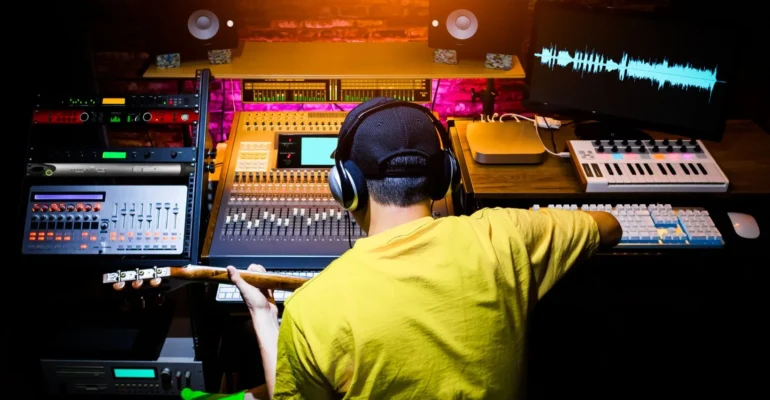Music and technology have always danced harmoniously, shaping the way we create, consume, and experience melodies. In this digital age, where innovation knows no bounds, the fusion of technology with music has sparked a revolution like never before. Let’s dive into how advancements in tech are transforming the very essence of music creation and enhancing our auditory journey like never before.
The Evolution of Music Production:
Music production has come a long way from the days of analogue recording, where artists would spend hours in studios working with physical tapes and mixing boards. With the advent of digital recording technology, musicians now have access to a wide range of software and hardware that allows for more flexibility and creativity in their music creation process.
Digital audio workstations (DAWs) have revolutionised the way music is produced by offering powerful tools for editing, mixing, and mastering tracks. Artists can now easily manipulate sounds, add effects, and experiment with different arrangements right from their computers.
Advancements in software plugins and virtual instruments have also played a significant role in shaping modern music production. From realistic drum samples to virtual synths that mimic classic analogue gear, musicians have endless possibilities at their fingertips when it comes to creating unique sounds and textures for their music.
– From analogue to digital recording
In the past, music production relied heavily on analogue recording equipment like reels and tapes. However, with technological advancements, the shift to digital recording has revolutionised the industry. Digital tools offer musicians unparalleled flexibility and precision in shaping their sound.
Gone are the days of limited track counts and cumbersome editing processes. Now, artists can effortlessly manipulate every aspect of their music with just a few clicks. The ease of use and accessibility of digital recording software have democratised music creation, allowing aspiring artists to bring their ideas to life without breaking the bank.
Moreover, digital recording opens up endless possibilities for experimentation and creativity. Musicians can easily layer tracks, apply effects, and fine-tune every detail of their compositions with unprecedented ease. This transition from analog to digital has truly transformed the way music is produced and experienced today.
– Advancements in software and hardware
Advancements in software and hardware have revolutionised the music production landscape, offering a plethora of creative possibilities for artists. With digital audio workstations (DAWs) becoming more powerful and user-friendly, musicians can now easily record, edit, and mix their tracks with professional quality.
The introduction of virtual instruments and plugins has expanded the sonic palette available to producers, allowing them to experiment with new sounds and textures. From realistic emulations of analogue gear to futuristic synthesisers, the options are virtually limitless.
On the hardware front, innovations like MIDI controllers and high-quality microphones have made it easier for musicians to capture their ideas with precision. These tools enable seamless integration between the physical world of instruments and the digital realm of production.
As technology continues to advance rapidly in the music industry, artists are empowered to push boundaries creatively like never before. The future holds even more exciting developments that will shape how music is created and experienced globally.
Accessibility for Musicians:
Technology has revolutionised the music industry by making music creation more accessible than ever before. Gone are the days when musicians needed expensive recording studios to produce their tracks. Now, with just a laptop and some software, artists can create professional-quality music from the comfort of their own homes.
Online platforms and tools have also played a significant role in lowering barriers to entry for aspiring musicians. Websites like Soundtrap and BandLab offer free or affordable options for creating, sharing, and collaborating on music projects. This democratisation of music production has empowered artists from diverse backgrounds to share their voices with the world.
Furthermore, advancements in technology have enabled musicians to connect with audiences globally without having to rely on traditional record labels or distribution channels. Independent artists now have the opportunity to build their fan base through social media and streaming platforms, reaching listeners across borders and genres.
– Lower barriers to entry for music creation
Technology has significantly lowered the barriers to entry for aspiring musicians, making it easier than ever to create music. With the rise of affordable recording equipment and software, artists can now produce professional-quality tracks from the comfort of their own homes.
Online platforms like Soundtrap and BandLab offer intuitive interfaces that allow beginners to start producing music without a steep learning curve. These tools provide access to virtual instruments, loops, and effects, empowering users to experiment with different sounds and styles.
Furthermore, the internet has democratized music distribution through streaming services and social media. Independent artists can now reach global audiences without relying on traditional record labels or expensive marketing campaigns.
Technology has revolutionized the music industry by democratizing the creative process and giving a voice to new talents around the world.
– Online music production tools and platforms
Technology has revolutionized music creation by providing online tools and platforms that empower musicians of all levels. These digital resources offer a wide range of features to enhance the production process, from virtual instruments to collaborative capabilities.
Online music production tools enable artists to work remotely with other creators in real time, breaking down geographical barriers and fostering global collaboration. With just a stable internet connection, musicians can access high-quality software for recording, editing, mixing, and mastering their tracks efficiently.
Platforms like Soundtrap, BandLab, and Splice have democratized music-making by offering affordable subscriptions or even free versions with basic functionalities. This accessibility allows aspiring artists to explore their creativity without investing in expensive equipment or studio time.
Moreover, these online tools provide tutorials and communities where users can learn new techniques and connect with like-minded individuals. The digital landscape continues to evolve rapidly, opening up endless possibilities for innovative music production experiences.
Enhanced Listening Experience:
In today’s digital age, technology has revolutionized the way we experience music. One aspect where this impact is especially noteworthy is in the realm of enhanced listening experiences.
With the rise of high-quality audio streaming services like Spotify and Tidal, music enthusiasts can now enjoy their favourite tracks with unparalleled clarity and depth. This shift towards higher fidelity audio has truly transformed how we consume music.
Moreover, virtual and augmented reality technologies have opened up new possibilities for immersive concert experiences. Imagine being able to attend a live show from the comfort of your own home, feeling as though you’re right there in the crowd alongside other fans.
These innovations not only elevate our enjoyment of music but also push boundaries in terms of creativity and engagement within the industry. As technology continues to evolve, so too will our ability to connect with music on a deeper level than ever before.
– High-quality audio streaming services
With the rise of technology, music lovers now have access to high-quality audio streaming services that offer an unparalleled listening experience. Gone are the days of low-resolution sound – today’s streaming platforms provide crystal-clear audio that allows every note and instrument to shine through.
Whether you’re a fan of rock, pop, electronic, or classical music, these services deliver top-notch sound quality straight to your devices. By utilizing advanced compression algorithms and efficient streaming protocols, users can enjoy their favourite tracks in stunning detail without any loss in fidelity.
Moreover, with features like personalized playlists and recommendations based on listening habits, these platforms make it easier than ever to discover new music and expand your musical horizon. With just a few clicks or taps, you can dive into a world of endless sonic possibilities at your fingertips.
In this digital age where convenience is key, high-quality audio streaming services ensure that music enthusiasts can immerse themselves in their favourite tunes wherever they go. It’s not just about hearing the music – it’s about experiencing it in its purest form.
– Virtual and augmented reality concerts
Imagine being transported into a digital realm where you can attend a concert from the comfort of your own home. Virtual and augmented reality technology is revolutionizing the live music experience by offering immersive performances like never before.
With VR concerts, fans have the opportunity to interact with their favourite artists in a virtual space, creating a sense of presence that transcends physical barriers. From front-row seats to 360-degree views, these experiences redefine how we engage with music.
Augmented reality takes things one step further by blending virtual elements into our real-world environment. This innovative technology allows for unique visual displays and interactive components during live performances, enhancing the overall concert experience.
As this technology continues to evolve, we can expect even more groundbreaking innovations in the way we consume and engage with music. The future of virtual and augmented reality concerts holds endless possibilities for both artists and fans alike.
Effects on the Industry:
Technology has undeniably disrupted the music industry, challenging traditional business models and paving the way for new opportunities. With digital platforms enabling direct artist-to-fan connections, independent musicians now have a global stage to showcase their talent without relying on major record labels.
Streaming services have revolutionized how we consume music, offering high-quality audio with convenience at our fingertips. This shift has reshaped revenue streams for artists and pushed them to focus more on live performances and merchandise sales as primary income sources.
Virtual and augmented reality concerts have taken the live music experience to a whole new level, allowing fans to immerse themselves in virtual worlds alongside their favourite artists. This innovative approach blurs the line between physical and digital realms, creating unique interactions that resonate deeply with audiences.
As technology continues to evolve, it will be fascinating to see how these advancements further shape the landscape of the music industry, empowering creators and listeners alike with endless possibilities.
– Disrupting traditional business models
Technology has truly shaken up the traditional business models within the music industry. With the rise of digital streaming services, artists have found new ways to reach their audience directly without needing a record label’s backing. This shift in power dynamics has put more control into the hands of musicians who can now release music independently and retain a larger portion of their earnings.
Additionally, social media platforms and digital marketing tools have enabled artists to promote themselves effectively without relying solely on expensive marketing campaigns. This change has leveled the playing field for emerging musicians who can now compete with established acts by strategically utilizing online resources.
Furthermore, technology has facilitated innovative revenue streams such as crowdfunding and virtual concerts, providing alternative income sources for artists beyond traditional album sales and touring. As technology continues to evolve, we can expect further disruptions that will reshape how music is created, distributed, and consumed in the future.
– Opportunities for independent artists
Independent artists have found a new playing field in the digital age, thanks to technology. With the rise of social media platforms and streaming services, musicians can now reach global audiences from their own homes. This accessibility has levelled the playing field, allowing indie artists to compete with major labels.
Moreover, online tools like music distribution platforms and crowdfunding sites provide independent artists with avenues for funding and promoting their work without relying on traditional record deals. These opportunities empower musicians to retain creative control over their music while building loyal fan bases directly.
Additionally, advancements in home recording equipment and software have made it easier for independent artists to produce professional-quality music independently. This DIY approach not only saves costs but also allows for experimentation and artistic freedom.
Technology has revolutionized the music industry by opening doors for independent artists to thrive in an increasingly competitive landscape.
Ethical
Ethical considerations in the intersection of technology and music are crucial. With advancements like AI-generated music, there is a need to address copyright issues and ensure fair compensation for artists. Moreover, privacy concerns arise with the collection of user data by streaming platforms. As technology continues to revolutionize music creation and experience, it is vital for industry stakeholders to prioritize ethical practices to maintain integrity and respect within the evolving landscape.
To know more, go to www.qawire.com



